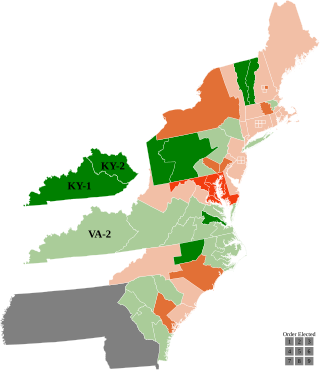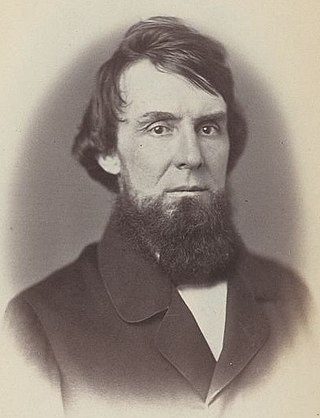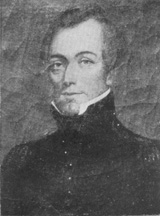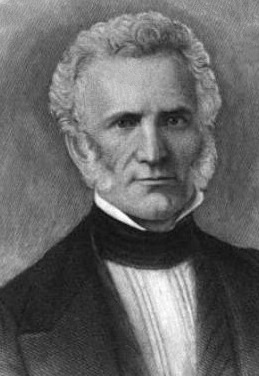Related Research Articles

William Rufus DeVane King was an American politician and diplomat. He was the 13th vice president of the United States from March 4 until his death in April 1853. Earlier he had served as a U.S. representative from North Carolina and a senator from Alabama. He also served as minister to France under President James K. Polk.

John Wesley Davis was an American physician and Democratic politician,active in the mid-1800s. He is best known for serving as Speaker of the United States House of Representatives,Governor of the Oregon Territory,and as a four-time member of the Indiana state legislature.

James Gore King was an American businessman and Whig Party politician who represented New Jersey's 5th congressional district in the United States House of Representatives for one term from 1849 to 1851.

Thomas George Pratt was a lawyer and politician from Annapolis,Maryland. He was the 27th governor of Maryland from 1845 to 1848 and a U.S. senator from 1850 to 1857.

The 33rd United States Congress was a meeting of the legislative branch of the United States federal government,consisting of the United States Senate and the United States House of Representatives. It met in Washington,D.C. from March 4,1853,to March 4,1855,during the first two years of Franklin Pierce's presidency. During this session,the Kansas–Nebraska Act was passed,an act that soon led to the creation of the Republican Party. The apportionment of seats in the House of Representatives was based on the 1850 United States census. Both chambers had a Democratic majority.

The 34th United States Congress was a meeting of the legislative branch of the United States federal government,consisting of the United States Senate and the United States House of Representatives. It met in Washington,D.C.,from March 4,1855,to March 4,1857,during the last two years of Franklin Pierce's presidency. The apportionment of seats in the House of Representatives was based on the 1850 United States census. The Whig Party,one of the two major parties of the era,had largely collapsed,although many former Whigs ran as Republicans or as members of the "Opposition Party." The Senate had a Democratic majority,and the House was controlled by a coalition of Representatives led by Nathaniel P. Banks,a member of the American Party.

Charles Polk Jr. was an American farmer and politician from Big Stone Beach,in Milford Hundred,Kent County,Delaware. He was a member of the Federalist Party,and later the Whig Party,who served in the Delaware General Assembly and twice as governor of Delaware.

The 1790–91 United States House of Representatives elections were held on various dates in various states between April 27,1790,and October 11,1791. Each state set its own date for its elections to the House of Representatives before or after the first session of the 2nd United States Congress convened on October 24,1791. This was the first midterm election cycle,which took place in the middle of President George Washington's first term. The size of the House increased to 67 seats after the new state of Vermont elected its first representatives.

Presley Spruance was an American merchant and politician from Smyrna,in Kent County,Delaware. He was a member of the Federalist and later the Whig Party,who served in the Delaware General Assembly and as U.S. Senator from Delaware.

Thomas Salem Bocock was a Confederate politician and lawyer from Virginia. After serving as an antebellum United States Congressman,he was the speaker of the Confederate States House of Representatives during most of the American Civil War.

Ner Middleswarth was an American politician from New Jersey who served as a Whig member of the U.S. House of Representatives for Pennsylvania's 10th congressional district from 1853 to 1855. He served as a member of the Pennsylvania State House of Representatives from 1815 to 1841 including two terms as speaker of the house. He also served as a member of the Pennsylvania Senate for the 15th district from 1853 to 1854.

John Christian Kunkel was a Whig and Republican member of the U.S. House of Representatives from Pennsylvania. He was the grandfather of John Crain Kunkel.
John Weinland Killinger was an American politician from Pennsylvania who served as a Republican member of the U.S. House of Representatives for Pennsylvania's 10th congressional district from 1859 to 1863 and from 1871 to 1875. He also served as a member of Pennsylvania's 14th congressional district from 1877 to 1881.
John Strohm was an American politician from Pennsylvania who served as a Whig member of the U.S. House of Representatives for Pennsylvania's 8th congressional district from 1845 to 1849.
Joseph Lawrence was a member of the U.S. House of Representatives from Pennsylvania.

William Barron Calhoun was a U.S. Representative from Massachusetts.

The 1856–57 United States Senate elections were held on various dates in various states. As these U.S. Senate elections were prior to the ratification of the Seventeenth Amendment in 1913,senators were chosen by state legislatures. Senators were elected over a wide range of time throughout 1856 and 1857,and a seat may have been filled months late or remained vacant due to legislative deadlock. In these elections,terms were up for the senators in Class 1.

Isaac Dutton Barnard was an American militia leader,lawyer,and politician who served as a United States Senator for Pennsylvania from 1827 to 1831. He served as a Major in the U.S. Army during the War of 1812 and as a Pennsylvania State Senator for the 4th district from 1820 until 1826.

Charles Bingham Penrose was an American politician who served as a Democratic-Republican and Whig member of the Pennsylvania Senate for the 16th and 14th district from 1833 to 1841 and as a Republican member for the 1st district in 1857. He served as Speaker of the Pennsylvania Senate from 1838 to 1839 and again in 1841. He was a key figure during the Buckshot War unrest in Harrisburg,Pennsylvania,after the 1838 legislative election,when both Whigs and Democrats claimed control over the Pennsylvania House of Representatives.
William Myron King,also known as Colonel King for most of his life,was an American pioneer merchant and Oregon state legislator. He served four terms in Oregon's territorial legislature. This included one term as Speaker of the Oregon House of Representatives during the 1851 legislative session. Before immigrating to Oregon,King lived and worked in New York,Pennsylvania,Ohio,and Missouri. After moving to Oregon in 1848,he became a merchant in Portland,and was later the county judge for Multnomah County and a member of Portland's city council.
References
- 1 2 3 4 5 Bates, Samuel Penniman; Richard, Jacob Fraise (1887). History of Franklin county, Pennsylvania, containing a history of the county, its townships, towns, villages, schools, churches, industries...biographies: history of Pennsylvania, statistical and miscellaneous matter, etc. ... Chicago. p. 848. Retrieved 20 February 2024.
{{cite book}}: CS1 maint: location missing publisher (link) - 1 2 "Thomas Erskine Carson". Pennsylvania State Senate . Retrieved 20 February 2024.
- ↑ "Thomas Carson". Pennsylvania House of Representatives . Retrieved 20 February 2024.